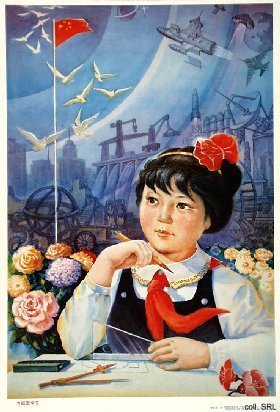Studying for the mother country, 1986

Annotation
Visual images provide valuable material for the exploration of childhood, youth and history. Propaganda posters from the People’s Republic of China (1949-present) are particularly rich, offering images that are both bold and subtle, and which many students find as nicely accessible sources to explore. The posters offer a sense of the ways in which a Chinese state and the individual artists it employed sought to use the image of the child to gain a broader public investment in political movements and to define new visions of the revolutionary cause, particularly during the Great Proletarian Cultural Revolution (1966-1976). Exploration of the imagery of children in these posters provides useful sources through which to explore the ways in which images of children would come to signify broader social and political meanings and to potentially inspire both youths and adults in their own definitions of self-identity.
This image appeared following the arrival of a Chinese reform agenda and the end of the Maoist campaigns. Entitled, "Studying for the mother country, 1986," it presents a girl at the center of an image that invokes many of the official "four modernizations" (specifically, industry, technology, agriculture, and defense) that were proclaimed by a new leader, Deng Xiaoping, as the primary goals for building a strong Chinese nation. Students may explore the ways in which the busy detail of this image represents themes of industrialization, urbanization, national progress (as symbolized by a space program, among other projects), as well as the combined imagery of the flag, the doves around it, and, importantly, the tools that the girl herself thoughtfully wields.
This source is a part of the Chinese Propaganda Posters teaching module.
Credits
"Studying for the mother country, 1986", Stefan Landsberger’s Chinese Propaganda Poster Pages, http://www.iisg.nl/landsberger/index.html (accessed March 9, 2009).